University of Adelaide - Commercial Law I Assignment, Semester 2, 2019
VerifiedAdded on 2022/10/13
|10
|2285
|12
Homework Assignment
AI Summary
This Commercial Law assignment solution addresses three key legal issues. The first analyzes a lottery syndicate dispute, focusing on contract formation elements like offer, acceptance, and consideration. The second examines whether a car owner can sue a mechanic shop based on the four corners rule, concerning the admissibility of evidence outside a written contract. The third part explores contract termination, differentiating between situations where Adelaide Super cannot terminate a contract with Mitoshi due to frustration and a scenario where a contract is frustrated due to unforeseen circumstances like a ship hijacking, discussing the applicability of frustrated contracts and their impact on commercial agreements. The solution provides detailed legal reasoning and references relevant case law to support its conclusions, offering a thorough analysis of contract law principles.
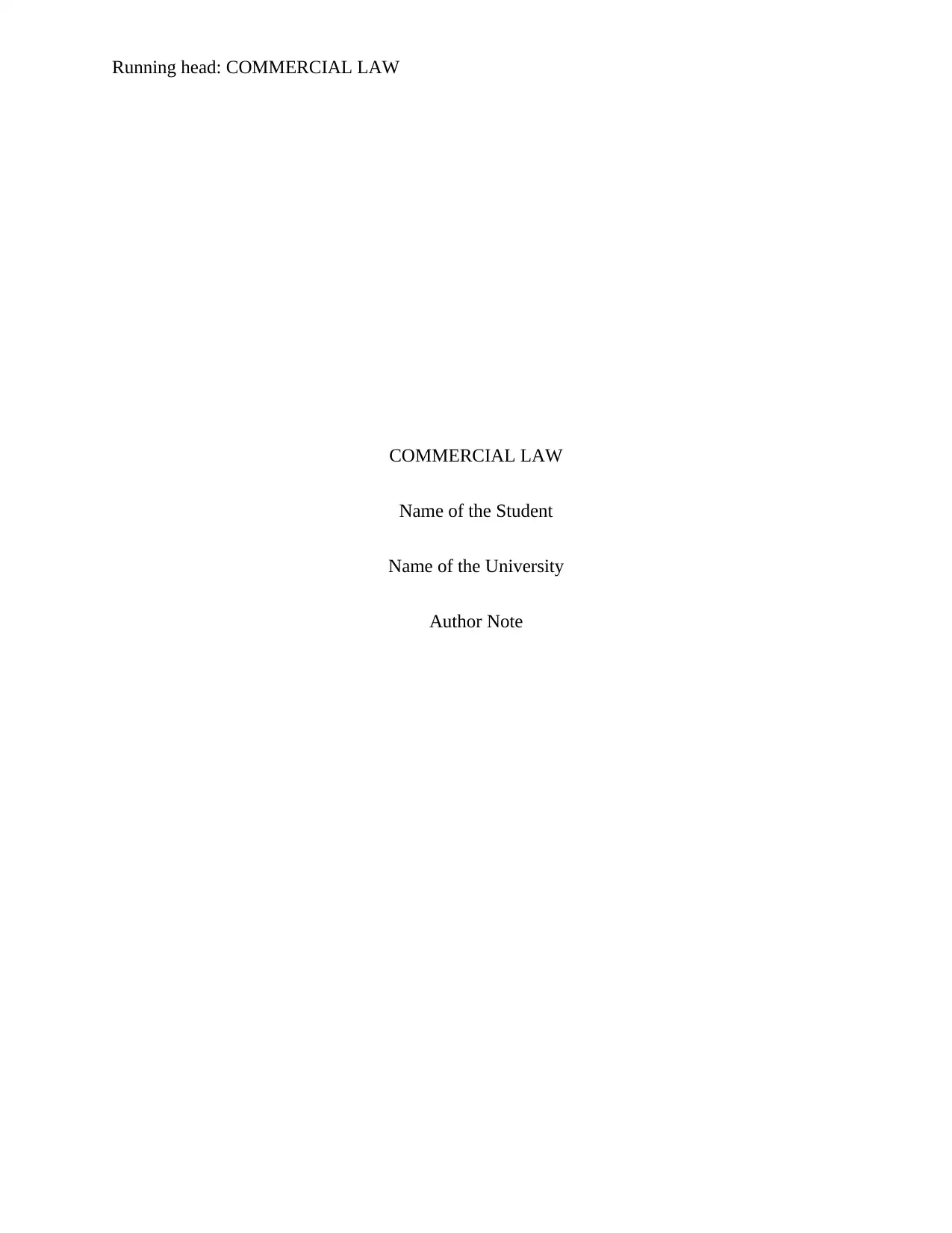
Running head: COMMERCIAL LAW
COMMERCIAL LAW
Name of the Student
Name of the University
Author Note
COMMERCIAL LAW
Name of the Student
Name of the University
Author Note
Paraphrase This Document
Need a fresh take? Get an instant paraphrase of this document with our AI Paraphraser
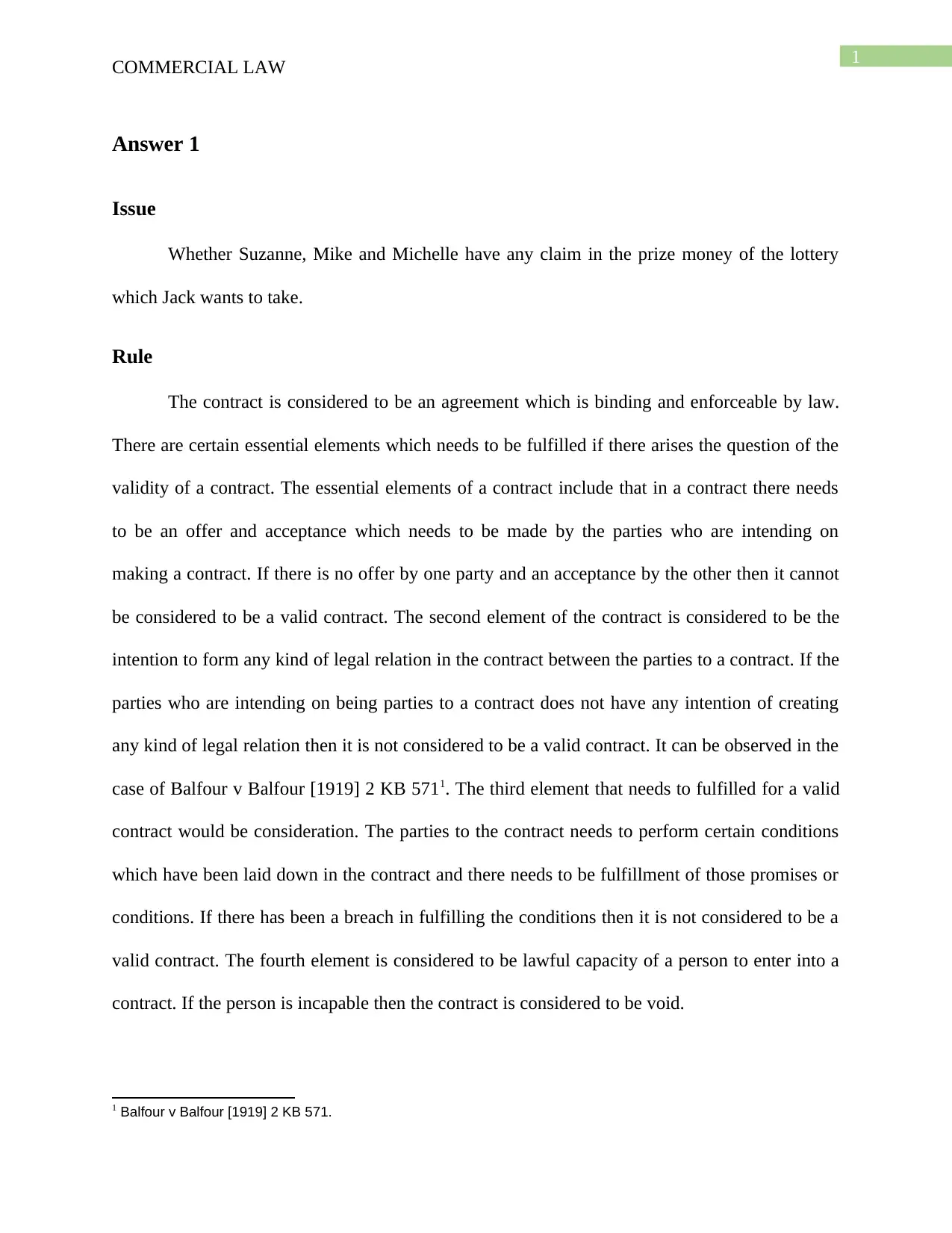
1
COMMERCIAL LAW
Answer 1
Issue
Whether Suzanne, Mike and Michelle have any claim in the prize money of the lottery
which Jack wants to take.
Rule
The contract is considered to be an agreement which is binding and enforceable by law.
There are certain essential elements which needs to be fulfilled if there arises the question of the
validity of a contract. The essential elements of a contract include that in a contract there needs
to be an offer and acceptance which needs to be made by the parties who are intending on
making a contract. If there is no offer by one party and an acceptance by the other then it cannot
be considered to be a valid contract. The second element of the contract is considered to be the
intention to form any kind of legal relation in the contract between the parties to a contract. If the
parties who are intending on being parties to a contract does not have any intention of creating
any kind of legal relation then it is not considered to be a valid contract. It can be observed in the
case of Balfour v Balfour [1919] 2 KB 5711. The third element that needs to fulfilled for a valid
contract would be consideration. The parties to the contract needs to perform certain conditions
which have been laid down in the contract and there needs to be fulfillment of those promises or
conditions. If there has been a breach in fulfilling the conditions then it is not considered to be a
valid contract. The fourth element is considered to be lawful capacity of a person to enter into a
contract. If the person is incapable then the contract is considered to be void.
1 Balfour v Balfour [1919] 2 KB 571.
COMMERCIAL LAW
Answer 1
Issue
Whether Suzanne, Mike and Michelle have any claim in the prize money of the lottery
which Jack wants to take.
Rule
The contract is considered to be an agreement which is binding and enforceable by law.
There are certain essential elements which needs to be fulfilled if there arises the question of the
validity of a contract. The essential elements of a contract include that in a contract there needs
to be an offer and acceptance which needs to be made by the parties who are intending on
making a contract. If there is no offer by one party and an acceptance by the other then it cannot
be considered to be a valid contract. The second element of the contract is considered to be the
intention to form any kind of legal relation in the contract between the parties to a contract. If the
parties who are intending on being parties to a contract does not have any intention of creating
any kind of legal relation then it is not considered to be a valid contract. It can be observed in the
case of Balfour v Balfour [1919] 2 KB 5711. The third element that needs to fulfilled for a valid
contract would be consideration. The parties to the contract needs to perform certain conditions
which have been laid down in the contract and there needs to be fulfillment of those promises or
conditions. If there has been a breach in fulfilling the conditions then it is not considered to be a
valid contract. The fourth element is considered to be lawful capacity of a person to enter into a
contract. If the person is incapable then the contract is considered to be void.
1 Balfour v Balfour [1919] 2 KB 571.
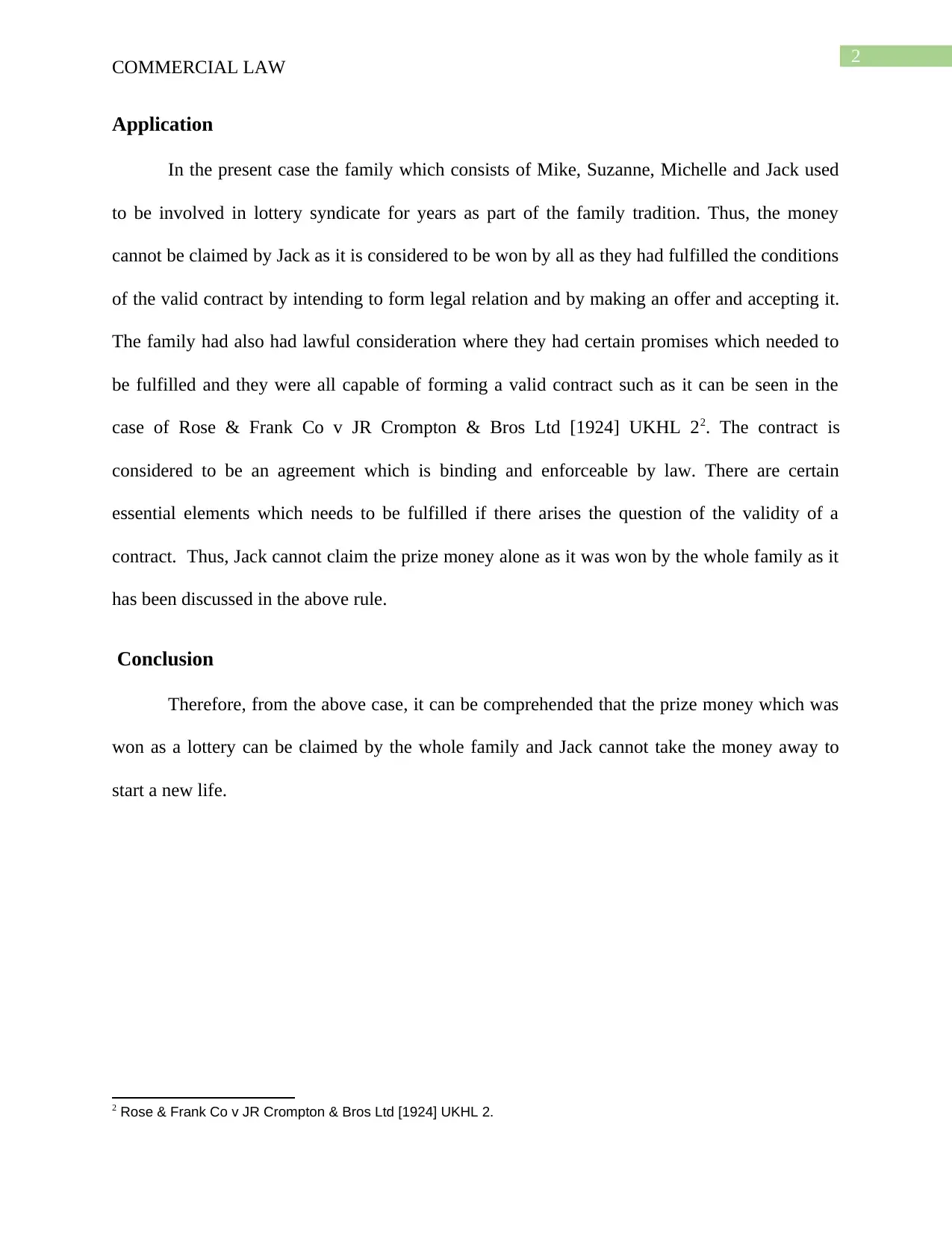
2
COMMERCIAL LAW
Application
In the present case the family which consists of Mike, Suzanne, Michelle and Jack used
to be involved in lottery syndicate for years as part of the family tradition. Thus, the money
cannot be claimed by Jack as it is considered to be won by all as they had fulfilled the conditions
of the valid contract by intending to form legal relation and by making an offer and accepting it.
The family had also had lawful consideration where they had certain promises which needed to
be fulfilled and they were all capable of forming a valid contract such as it can be seen in the
case of Rose & Frank Co v JR Crompton & Bros Ltd [1924] UKHL 22. The contract is
considered to be an agreement which is binding and enforceable by law. There are certain
essential elements which needs to be fulfilled if there arises the question of the validity of a
contract. Thus, Jack cannot claim the prize money alone as it was won by the whole family as it
has been discussed in the above rule.
Conclusion
Therefore, from the above case, it can be comprehended that the prize money which was
won as a lottery can be claimed by the whole family and Jack cannot take the money away to
start a new life.
2 Rose & Frank Co v JR Crompton & Bros Ltd [1924] UKHL 2.
COMMERCIAL LAW
Application
In the present case the family which consists of Mike, Suzanne, Michelle and Jack used
to be involved in lottery syndicate for years as part of the family tradition. Thus, the money
cannot be claimed by Jack as it is considered to be won by all as they had fulfilled the conditions
of the valid contract by intending to form legal relation and by making an offer and accepting it.
The family had also had lawful consideration where they had certain promises which needed to
be fulfilled and they were all capable of forming a valid contract such as it can be seen in the
case of Rose & Frank Co v JR Crompton & Bros Ltd [1924] UKHL 22. The contract is
considered to be an agreement which is binding and enforceable by law. There are certain
essential elements which needs to be fulfilled if there arises the question of the validity of a
contract. Thus, Jack cannot claim the prize money alone as it was won by the whole family as it
has been discussed in the above rule.
Conclusion
Therefore, from the above case, it can be comprehended that the prize money which was
won as a lottery can be claimed by the whole family and Jack cannot take the money away to
start a new life.
2 Rose & Frank Co v JR Crompton & Bros Ltd [1924] UKHL 2.
⊘ This is a preview!⊘
Do you want full access?
Subscribe today to unlock all pages.

Trusted by 1+ million students worldwide
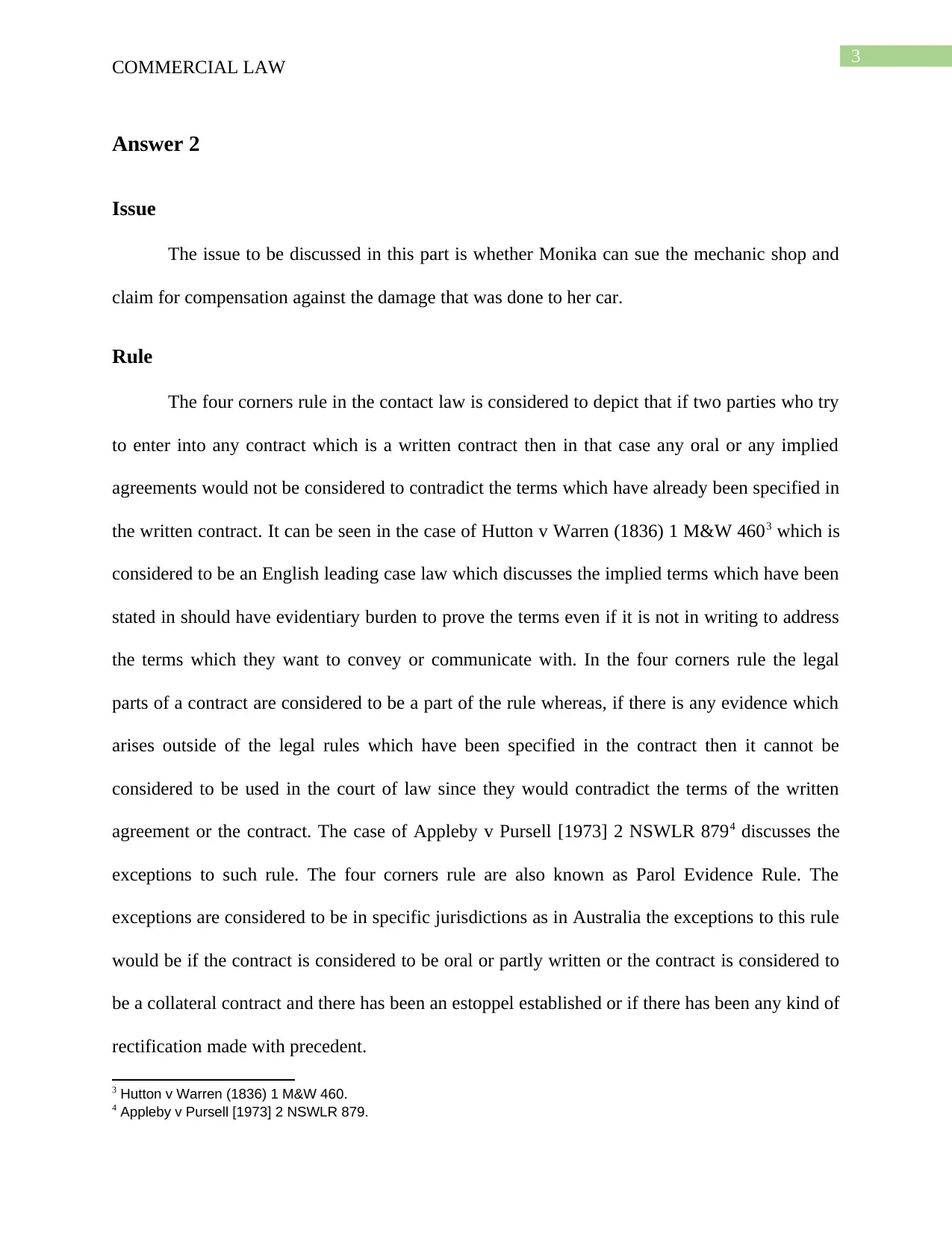
3
COMMERCIAL LAW
Answer 2
Issue
The issue to be discussed in this part is whether Monika can sue the mechanic shop and
claim for compensation against the damage that was done to her car.
Rule
The four corners rule in the contact law is considered to depict that if two parties who try
to enter into any contract which is a written contract then in that case any oral or any implied
agreements would not be considered to contradict the terms which have already been specified in
the written contract. It can be seen in the case of Hutton v Warren (1836) 1 M&W 4603 which is
considered to be an English leading case law which discusses the implied terms which have been
stated in should have evidentiary burden to prove the terms even if it is not in writing to address
the terms which they want to convey or communicate with. In the four corners rule the legal
parts of a contract are considered to be a part of the rule whereas, if there is any evidence which
arises outside of the legal rules which have been specified in the contract then it cannot be
considered to be used in the court of law since they would contradict the terms of the written
agreement or the contract. The case of Appleby v Pursell [1973] 2 NSWLR 8794 discusses the
exceptions to such rule. The four corners rule are also known as Parol Evidence Rule. The
exceptions are considered to be in specific jurisdictions as in Australia the exceptions to this rule
would be if the contract is considered to be oral or partly written or the contract is considered to
be a collateral contract and there has been an estoppel established or if there has been any kind of
rectification made with precedent.
3 Hutton v Warren (1836) 1 M&W 460.
4 Appleby v Pursell [1973] 2 NSWLR 879.
COMMERCIAL LAW
Answer 2
Issue
The issue to be discussed in this part is whether Monika can sue the mechanic shop and
claim for compensation against the damage that was done to her car.
Rule
The four corners rule in the contact law is considered to depict that if two parties who try
to enter into any contract which is a written contract then in that case any oral or any implied
agreements would not be considered to contradict the terms which have already been specified in
the written contract. It can be seen in the case of Hutton v Warren (1836) 1 M&W 4603 which is
considered to be an English leading case law which discusses the implied terms which have been
stated in should have evidentiary burden to prove the terms even if it is not in writing to address
the terms which they want to convey or communicate with. In the four corners rule the legal
parts of a contract are considered to be a part of the rule whereas, if there is any evidence which
arises outside of the legal rules which have been specified in the contract then it cannot be
considered to be used in the court of law since they would contradict the terms of the written
agreement or the contract. The case of Appleby v Pursell [1973] 2 NSWLR 8794 discusses the
exceptions to such rule. The four corners rule are also known as Parol Evidence Rule. The
exceptions are considered to be in specific jurisdictions as in Australia the exceptions to this rule
would be if the contract is considered to be oral or partly written or the contract is considered to
be a collateral contract and there has been an estoppel established or if there has been any kind of
rectification made with precedent.
3 Hutton v Warren (1836) 1 M&W 460.
4 Appleby v Pursell [1973] 2 NSWLR 879.
Paraphrase This Document
Need a fresh take? Get an instant paraphrase of this document with our AI Paraphraser
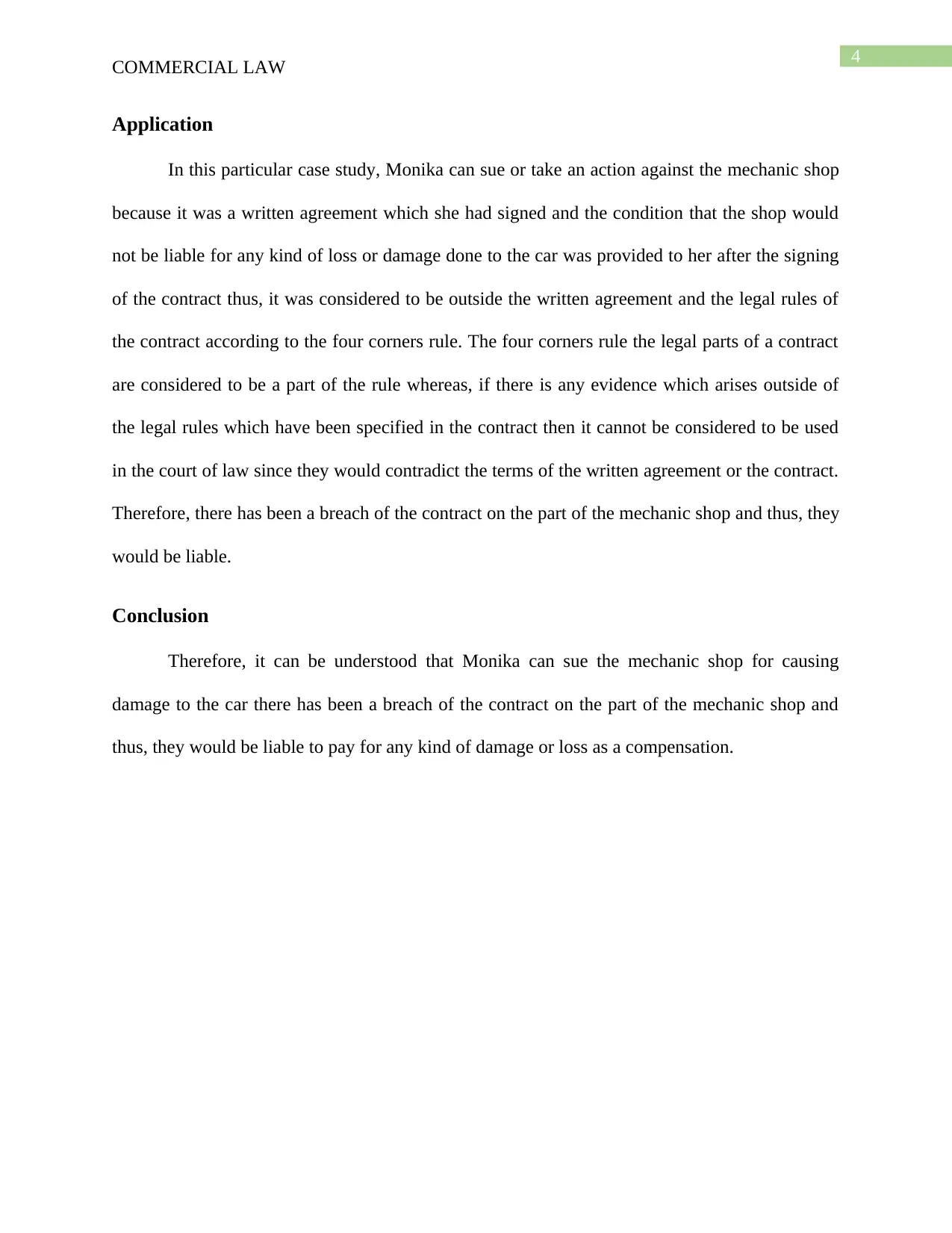
4
COMMERCIAL LAW
Application
In this particular case study, Monika can sue or take an action against the mechanic shop
because it was a written agreement which she had signed and the condition that the shop would
not be liable for any kind of loss or damage done to the car was provided to her after the signing
of the contract thus, it was considered to be outside the written agreement and the legal rules of
the contract according to the four corners rule. The four corners rule the legal parts of a contract
are considered to be a part of the rule whereas, if there is any evidence which arises outside of
the legal rules which have been specified in the contract then it cannot be considered to be used
in the court of law since they would contradict the terms of the written agreement or the contract.
Therefore, there has been a breach of the contract on the part of the mechanic shop and thus, they
would be liable.
Conclusion
Therefore, it can be understood that Monika can sue the mechanic shop for causing
damage to the car there has been a breach of the contract on the part of the mechanic shop and
thus, they would be liable to pay for any kind of damage or loss as a compensation.
COMMERCIAL LAW
Application
In this particular case study, Monika can sue or take an action against the mechanic shop
because it was a written agreement which she had signed and the condition that the shop would
not be liable for any kind of loss or damage done to the car was provided to her after the signing
of the contract thus, it was considered to be outside the written agreement and the legal rules of
the contract according to the four corners rule. The four corners rule the legal parts of a contract
are considered to be a part of the rule whereas, if there is any evidence which arises outside of
the legal rules which have been specified in the contract then it cannot be considered to be used
in the court of law since they would contradict the terms of the written agreement or the contract.
Therefore, there has been a breach of the contract on the part of the mechanic shop and thus, they
would be liable.
Conclusion
Therefore, it can be understood that Monika can sue the mechanic shop for causing
damage to the car there has been a breach of the contract on the part of the mechanic shop and
thus, they would be liable to pay for any kind of damage or loss as a compensation.
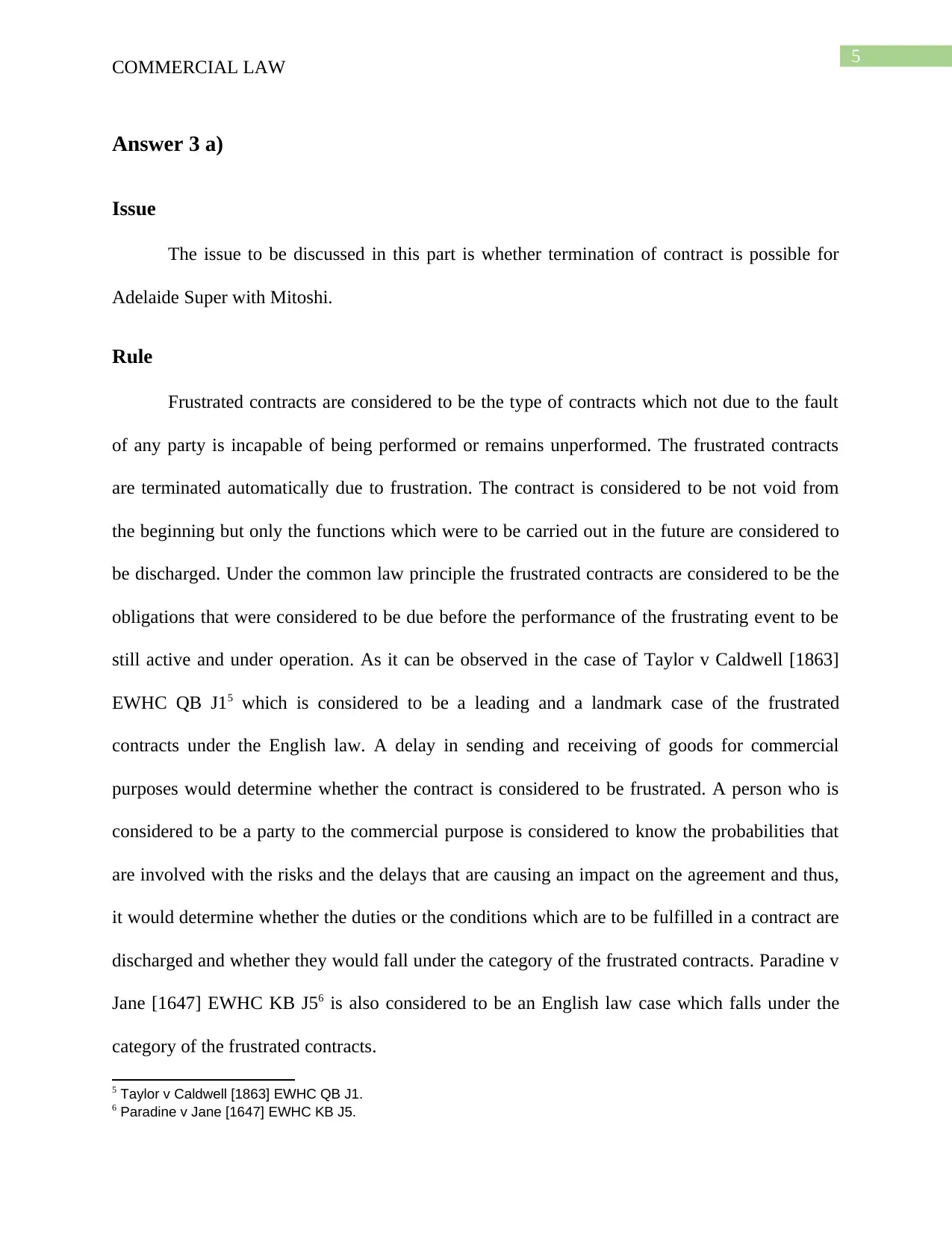
5
COMMERCIAL LAW
Answer 3 a)
Issue
The issue to be discussed in this part is whether termination of contract is possible for
Adelaide Super with Mitoshi.
Rule
Frustrated contracts are considered to be the type of contracts which not due to the fault
of any party is incapable of being performed or remains unperformed. The frustrated contracts
are terminated automatically due to frustration. The contract is considered to be not void from
the beginning but only the functions which were to be carried out in the future are considered to
be discharged. Under the common law principle the frustrated contracts are considered to be the
obligations that were considered to be due before the performance of the frustrating event to be
still active and under operation. As it can be observed in the case of Taylor v Caldwell [1863]
EWHC QB J15 which is considered to be a leading and a landmark case of the frustrated
contracts under the English law. A delay in sending and receiving of goods for commercial
purposes would determine whether the contract is considered to be frustrated. A person who is
considered to be a party to the commercial purpose is considered to know the probabilities that
are involved with the risks and the delays that are causing an impact on the agreement and thus,
it would determine whether the duties or the conditions which are to be fulfilled in a contract are
discharged and whether they would fall under the category of the frustrated contracts. Paradine v
Jane [1647] EWHC KB J56 is also considered to be an English law case which falls under the
category of the frustrated contracts.
5 Taylor v Caldwell [1863] EWHC QB J1.
6 Paradine v Jane [1647] EWHC KB J5.
COMMERCIAL LAW
Answer 3 a)
Issue
The issue to be discussed in this part is whether termination of contract is possible for
Adelaide Super with Mitoshi.
Rule
Frustrated contracts are considered to be the type of contracts which not due to the fault
of any party is incapable of being performed or remains unperformed. The frustrated contracts
are terminated automatically due to frustration. The contract is considered to be not void from
the beginning but only the functions which were to be carried out in the future are considered to
be discharged. Under the common law principle the frustrated contracts are considered to be the
obligations that were considered to be due before the performance of the frustrating event to be
still active and under operation. As it can be observed in the case of Taylor v Caldwell [1863]
EWHC QB J15 which is considered to be a leading and a landmark case of the frustrated
contracts under the English law. A delay in sending and receiving of goods for commercial
purposes would determine whether the contract is considered to be frustrated. A person who is
considered to be a party to the commercial purpose is considered to know the probabilities that
are involved with the risks and the delays that are causing an impact on the agreement and thus,
it would determine whether the duties or the conditions which are to be fulfilled in a contract are
discharged and whether they would fall under the category of the frustrated contracts. Paradine v
Jane [1647] EWHC KB J56 is also considered to be an English law case which falls under the
category of the frustrated contracts.
5 Taylor v Caldwell [1863] EWHC QB J1.
6 Paradine v Jane [1647] EWHC KB J5.
⊘ This is a preview!⊘
Do you want full access?
Subscribe today to unlock all pages.

Trusted by 1+ million students worldwide
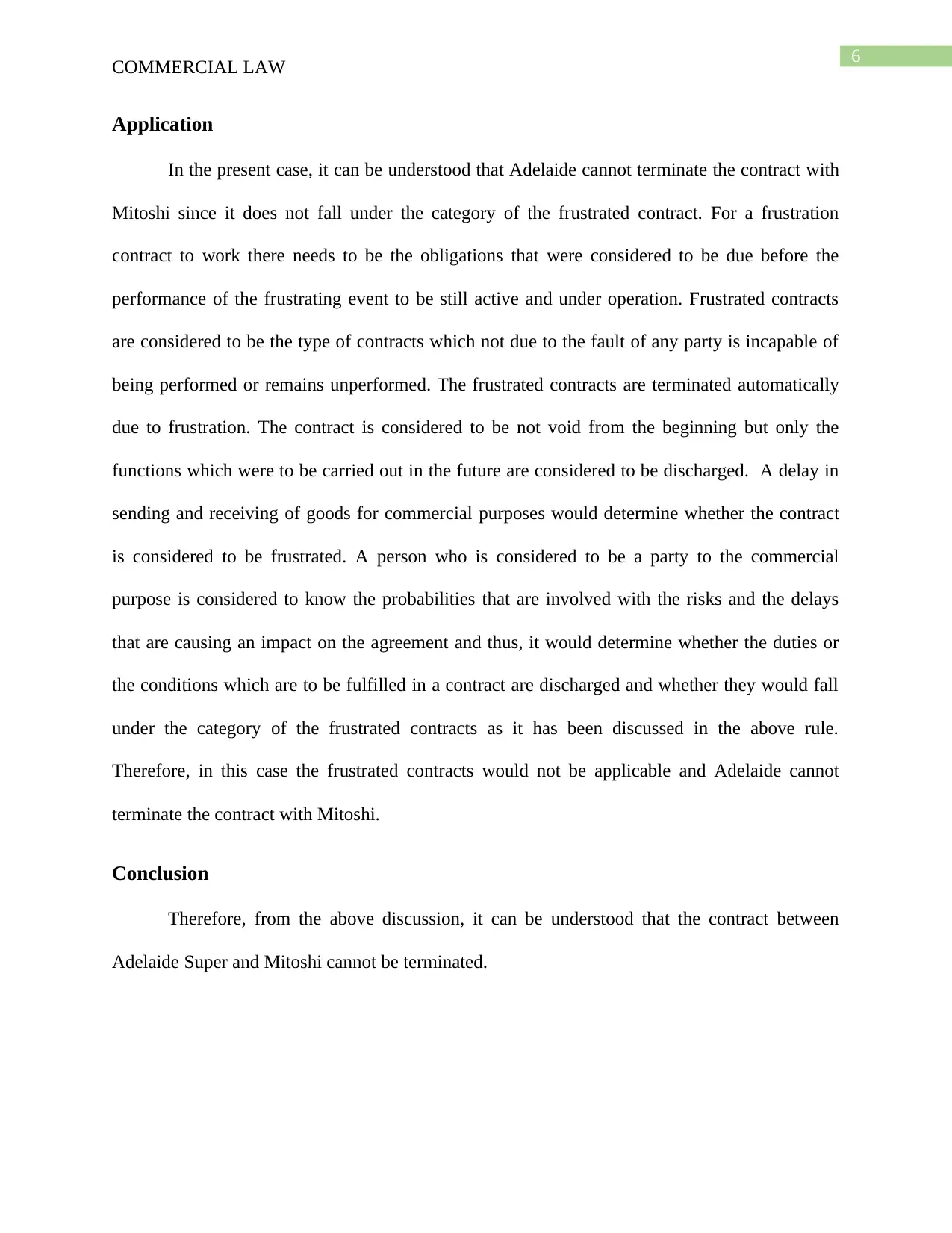
6
COMMERCIAL LAW
Application
In the present case, it can be understood that Adelaide cannot terminate the contract with
Mitoshi since it does not fall under the category of the frustrated contract. For a frustration
contract to work there needs to be the obligations that were considered to be due before the
performance of the frustrating event to be still active and under operation. Frustrated contracts
are considered to be the type of contracts which not due to the fault of any party is incapable of
being performed or remains unperformed. The frustrated contracts are terminated automatically
due to frustration. The contract is considered to be not void from the beginning but only the
functions which were to be carried out in the future are considered to be discharged. A delay in
sending and receiving of goods for commercial purposes would determine whether the contract
is considered to be frustrated. A person who is considered to be a party to the commercial
purpose is considered to know the probabilities that are involved with the risks and the delays
that are causing an impact on the agreement and thus, it would determine whether the duties or
the conditions which are to be fulfilled in a contract are discharged and whether they would fall
under the category of the frustrated contracts as it has been discussed in the above rule.
Therefore, in this case the frustrated contracts would not be applicable and Adelaide cannot
terminate the contract with Mitoshi.
Conclusion
Therefore, from the above discussion, it can be understood that the contract between
Adelaide Super and Mitoshi cannot be terminated.
COMMERCIAL LAW
Application
In the present case, it can be understood that Adelaide cannot terminate the contract with
Mitoshi since it does not fall under the category of the frustrated contract. For a frustration
contract to work there needs to be the obligations that were considered to be due before the
performance of the frustrating event to be still active and under operation. Frustrated contracts
are considered to be the type of contracts which not due to the fault of any party is incapable of
being performed or remains unperformed. The frustrated contracts are terminated automatically
due to frustration. The contract is considered to be not void from the beginning but only the
functions which were to be carried out in the future are considered to be discharged. A delay in
sending and receiving of goods for commercial purposes would determine whether the contract
is considered to be frustrated. A person who is considered to be a party to the commercial
purpose is considered to know the probabilities that are involved with the risks and the delays
that are causing an impact on the agreement and thus, it would determine whether the duties or
the conditions which are to be fulfilled in a contract are discharged and whether they would fall
under the category of the frustrated contracts as it has been discussed in the above rule.
Therefore, in this case the frustrated contracts would not be applicable and Adelaide cannot
terminate the contract with Mitoshi.
Conclusion
Therefore, from the above discussion, it can be understood that the contract between
Adelaide Super and Mitoshi cannot be terminated.
Paraphrase This Document
Need a fresh take? Get an instant paraphrase of this document with our AI Paraphraser
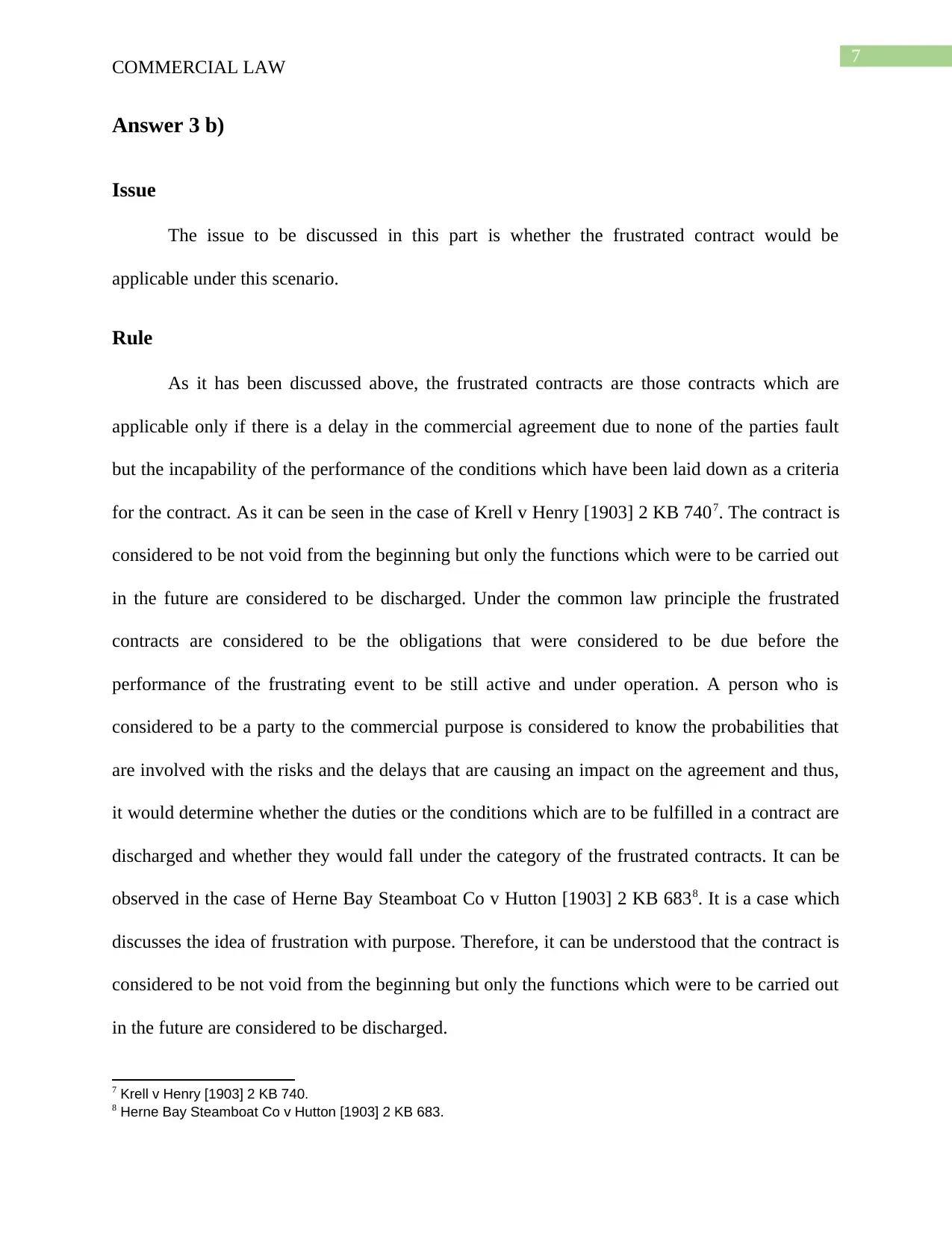
7
COMMERCIAL LAW
Answer 3 b)
Issue
The issue to be discussed in this part is whether the frustrated contract would be
applicable under this scenario.
Rule
As it has been discussed above, the frustrated contracts are those contracts which are
applicable only if there is a delay in the commercial agreement due to none of the parties fault
but the incapability of the performance of the conditions which have been laid down as a criteria
for the contract. As it can be seen in the case of Krell v Henry [1903] 2 KB 7407. The contract is
considered to be not void from the beginning but only the functions which were to be carried out
in the future are considered to be discharged. Under the common law principle the frustrated
contracts are considered to be the obligations that were considered to be due before the
performance of the frustrating event to be still active and under operation. A person who is
considered to be a party to the commercial purpose is considered to know the probabilities that
are involved with the risks and the delays that are causing an impact on the agreement and thus,
it would determine whether the duties or the conditions which are to be fulfilled in a contract are
discharged and whether they would fall under the category of the frustrated contracts. It can be
observed in the case of Herne Bay Steamboat Co v Hutton [1903] 2 KB 6838. It is a case which
discusses the idea of frustration with purpose. Therefore, it can be understood that the contract is
considered to be not void from the beginning but only the functions which were to be carried out
in the future are considered to be discharged.
7 Krell v Henry [1903] 2 KB 740.
8 Herne Bay Steamboat Co v Hutton [1903] 2 KB 683.
COMMERCIAL LAW
Answer 3 b)
Issue
The issue to be discussed in this part is whether the frustrated contract would be
applicable under this scenario.
Rule
As it has been discussed above, the frustrated contracts are those contracts which are
applicable only if there is a delay in the commercial agreement due to none of the parties fault
but the incapability of the performance of the conditions which have been laid down as a criteria
for the contract. As it can be seen in the case of Krell v Henry [1903] 2 KB 7407. The contract is
considered to be not void from the beginning but only the functions which were to be carried out
in the future are considered to be discharged. Under the common law principle the frustrated
contracts are considered to be the obligations that were considered to be due before the
performance of the frustrating event to be still active and under operation. A person who is
considered to be a party to the commercial purpose is considered to know the probabilities that
are involved with the risks and the delays that are causing an impact on the agreement and thus,
it would determine whether the duties or the conditions which are to be fulfilled in a contract are
discharged and whether they would fall under the category of the frustrated contracts. It can be
observed in the case of Herne Bay Steamboat Co v Hutton [1903] 2 KB 6838. It is a case which
discusses the idea of frustration with purpose. Therefore, it can be understood that the contract is
considered to be not void from the beginning but only the functions which were to be carried out
in the future are considered to be discharged.
7 Krell v Henry [1903] 2 KB 740.
8 Herne Bay Steamboat Co v Hutton [1903] 2 KB 683.
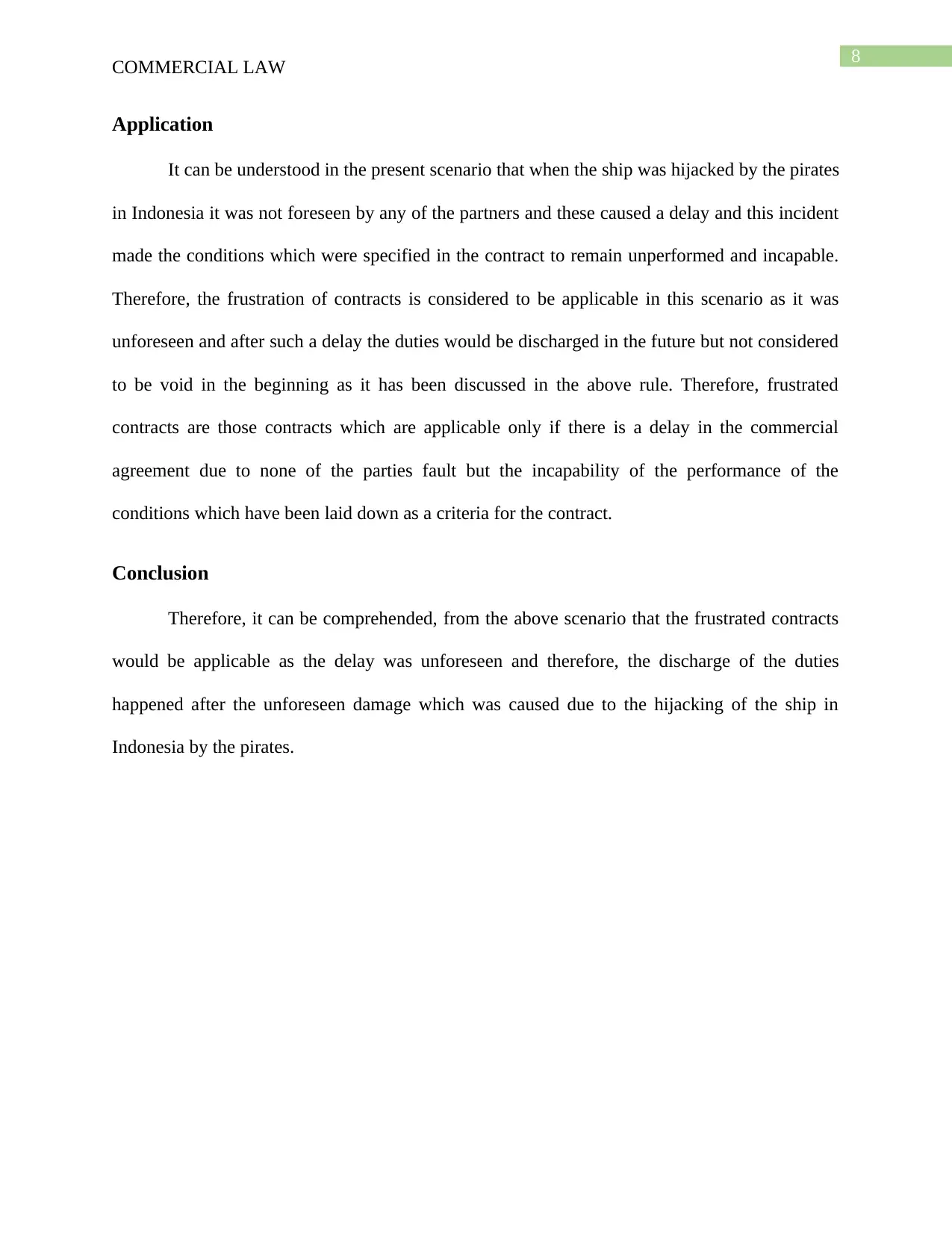
8
COMMERCIAL LAW
Application
It can be understood in the present scenario that when the ship was hijacked by the pirates
in Indonesia it was not foreseen by any of the partners and these caused a delay and this incident
made the conditions which were specified in the contract to remain unperformed and incapable.
Therefore, the frustration of contracts is considered to be applicable in this scenario as it was
unforeseen and after such a delay the duties would be discharged in the future but not considered
to be void in the beginning as it has been discussed in the above rule. Therefore, frustrated
contracts are those contracts which are applicable only if there is a delay in the commercial
agreement due to none of the parties fault but the incapability of the performance of the
conditions which have been laid down as a criteria for the contract.
Conclusion
Therefore, it can be comprehended, from the above scenario that the frustrated contracts
would be applicable as the delay was unforeseen and therefore, the discharge of the duties
happened after the unforeseen damage which was caused due to the hijacking of the ship in
Indonesia by the pirates.
COMMERCIAL LAW
Application
It can be understood in the present scenario that when the ship was hijacked by the pirates
in Indonesia it was not foreseen by any of the partners and these caused a delay and this incident
made the conditions which were specified in the contract to remain unperformed and incapable.
Therefore, the frustration of contracts is considered to be applicable in this scenario as it was
unforeseen and after such a delay the duties would be discharged in the future but not considered
to be void in the beginning as it has been discussed in the above rule. Therefore, frustrated
contracts are those contracts which are applicable only if there is a delay in the commercial
agreement due to none of the parties fault but the incapability of the performance of the
conditions which have been laid down as a criteria for the contract.
Conclusion
Therefore, it can be comprehended, from the above scenario that the frustrated contracts
would be applicable as the delay was unforeseen and therefore, the discharge of the duties
happened after the unforeseen damage which was caused due to the hijacking of the ship in
Indonesia by the pirates.
⊘ This is a preview!⊘
Do you want full access?
Subscribe today to unlock all pages.

Trusted by 1+ million students worldwide
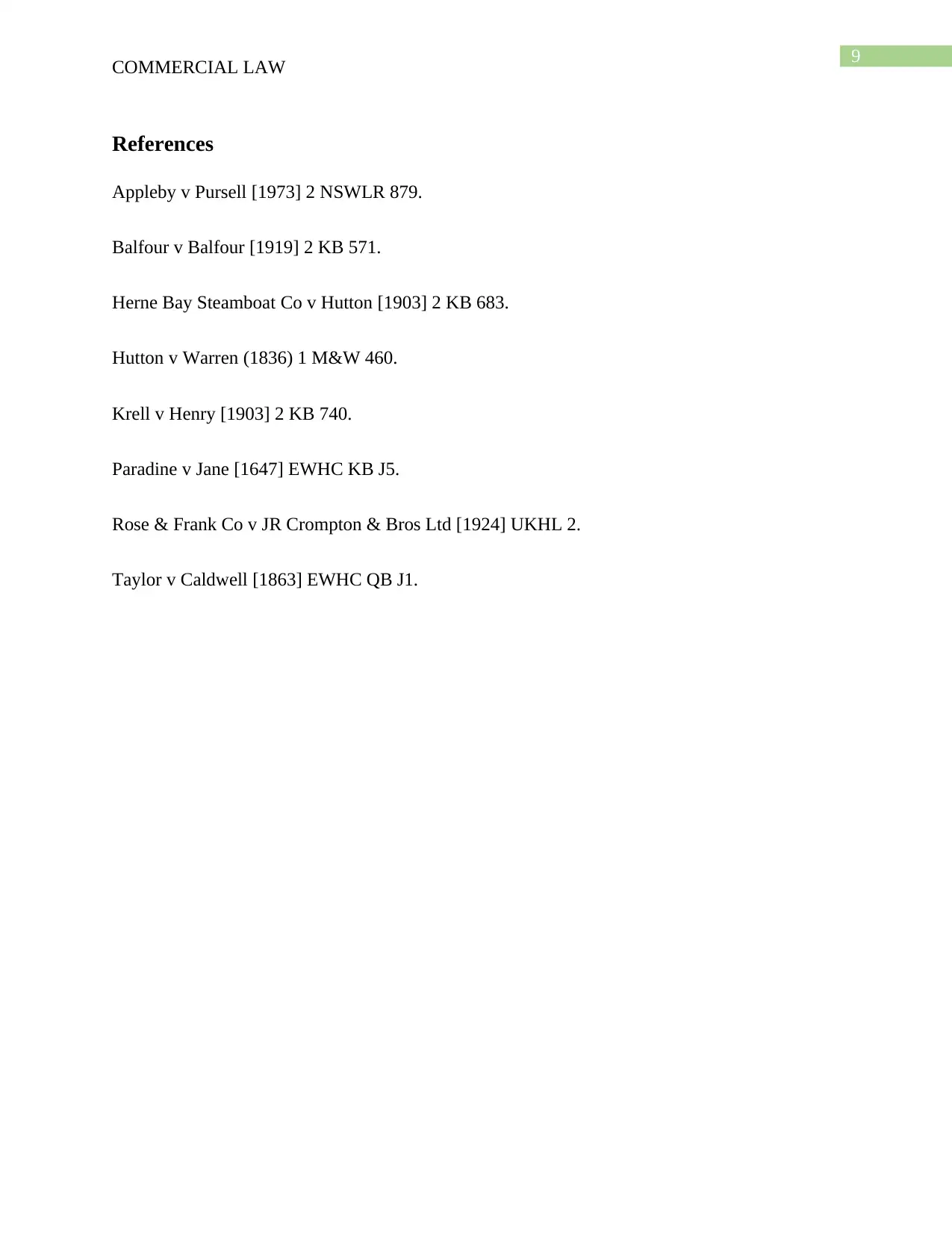
9
COMMERCIAL LAW
References
Appleby v Pursell [1973] 2 NSWLR 879.
Balfour v Balfour [1919] 2 KB 571.
Herne Bay Steamboat Co v Hutton [1903] 2 KB 683.
Hutton v Warren (1836) 1 M&W 460.
Krell v Henry [1903] 2 KB 740.
Paradine v Jane [1647] EWHC KB J5.
Rose & Frank Co v JR Crompton & Bros Ltd [1924] UKHL 2.
Taylor v Caldwell [1863] EWHC QB J1.
COMMERCIAL LAW
References
Appleby v Pursell [1973] 2 NSWLR 879.
Balfour v Balfour [1919] 2 KB 571.
Herne Bay Steamboat Co v Hutton [1903] 2 KB 683.
Hutton v Warren (1836) 1 M&W 460.
Krell v Henry [1903] 2 KB 740.
Paradine v Jane [1647] EWHC KB J5.
Rose & Frank Co v JR Crompton & Bros Ltd [1924] UKHL 2.
Taylor v Caldwell [1863] EWHC QB J1.
1 out of 10
Related Documents
Your All-in-One AI-Powered Toolkit for Academic Success.
+13062052269
info@desklib.com
Available 24*7 on WhatsApp / Email
![[object Object]](/_next/static/media/star-bottom.7253800d.svg)
Unlock your academic potential
Copyright © 2020–2025 A2Z Services. All Rights Reserved. Developed and managed by ZUCOL.





